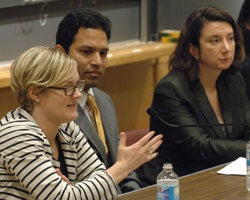
Former clerks of the International Court of Justice shared their experiences with Harvard Law School students in December at “Behind the Scenes at the World Court: International Court of Justice Clerk Panel,” a panel discussion sponsored by the Harvard International Affairs Council, the Harvard International Law Journal, Freshfields Bruckhaus Deringer and Debevoise & Plimpton.
From genocide claims to territorial contests, the ICJ’s docket shapes the contours of modern international law and some of the world’s most contentious international disputes.
Panelists included: Debevoise & Plimpton associate Rebecca Jenkin, who served as an ICJ clerk from 2006 to 2007 for Judge Kenneth Keith of New Zealand and Judge Leonid Skotnikov of Russia; Freshfields Bruckhaus Deringer associate Viren Mascarenhas, who clerked from 2005 to 2006 for then-President of the ICJ, Judge Rosalyn Higgins of England; and Freshfields Bruckhaus Deringer associate Ruth Teitelbaum, who clerked at the ICJ from 2006 to 2008, first in the registry and later for Judge Thomas Buergenthal LL.M. ’61 S.J.D. ’68 of the United States.
The panelists began by discussing some of the differences between the ICJ and U.S. federal courts. One key difference is that all 15 of the ICJ’s judges sit on every case, Jenkin said. “That really affects the dynamics of the court.”
As the principal judicial organ of the United Nations, “ the ICJ differs from domestic courts because, although people would like this to change sometimes, it’s ultimately a system of consensual jurisdiction to get before the ICJ,” Mascarenhas said.
In other words, the ICJ has jurisdiction in contentious issues that arise between states, but only when the states agree to submit to the ruling of the court. The ICJ also has advisory jurisdiction, under which the court gives non-binding opinions on questions of international law.
The panelists were asked to elaborate on some institutional challenges that are unique to the ICJ.
“Some of the cases … involve massive atrocities, many of which are within public knowledge, many of which occurred years ago. The court really has to depend to a great extent on what the parties present to them,” Teitelbaum said.
“Generally, the court does a very good job of handling all different types of international questions, but when it comes to things based on armed conflict, based on allegations that a state has supported paramilitary activities, [fact-checking] is really a challenge.”
“Trying to decide anything in a community with 15 people is a challenge, let alone trying to draft a 100 or 200-page judgment, and then add onto that … the fact that people are coming to these things from totally different perspectives,” Jenkin said. “If you think that at law school, you have a spectrum of perspectives on things, remember that you’re all coming from the same legal tradition and speaking the same legal language. Once I got to the court, I was actually surprised … at the coherence of the final product.”
The panelists stressed that students who want to become international law scholars should follow each of the four to five cases that appear on the ICJ docket each year.
“There aren’t that many cases pending,” Teitelbaum said. “Even the boring cases really are the bread and butter of international law concepts.”
The discussion moved on to the clerkship application process and the panelists’ personal experiences at the court.
The scope of a clerk’s responsibilities varies, depending on the judge being served, they said. Jenkin would often spend two hours a day discussing court issues with New Zealand’s Judge Keith, whereas Mascarenhas would complete dense research memos for England’s Judge Higgins.
“She would find the one point in a 10-page memo that she thought was interesting or insightful, [which] would then be the scope of a five-minute conversation where she would say why I was wrong – it was good,” Mascarenhas said.
Teitelbaum enjoyed taking a different track and working with staff attorneys as the only American in the French-speaking registry office.
“You see a [different] side of the court,” she said. “You see every procedural matter that comes up and … participate in drafting committees.”
The panelists wrapped up with discussion of how the knowledge they gained at the ICJ has impacted their practice of international law in a law firm setting.
“I’ve applied that knowledge in my practice at Debevoise in ways… I’d have never predicted,” Jenkin said. “The ability to get a grounding in the basic principles of public international law [at the ICJ] is probably unparalleled.”